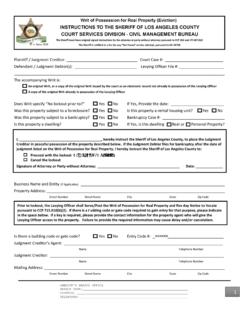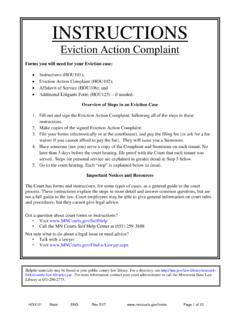Transcription of What South Carolina Law Says About The Eviction Process
1 Unpaid rent or damage you caused. The landlord cannot keep your security deposit to pay for normal wear and tear of the property that would naturally occur from living in a house or apartment. For example, a nail hole in the wall from hanging a picture would probably be ordinary wear and tear, but a hole kicked or punched in the wall would not be. Housing DiscriminationIf you feel you have been discriminated against, you should call the HUD Housing Discrimination Hotline at their toll-free number: 1-800-669-9777. This brochure was developed and published by the South Carolina Appleseed Legal Justice Center. Funding was provided by the South Carolina Bar Foundation s Interest on Lawyer Trust Accounts (IOLTA) program.
2 If you have a very low income, your local legal services office may be able to help you. To get in touch with them, call the Legal Assistance Telephone Intake Service for a referral at 744-9430 in Columbia or toll free (888)346-5592 from other places in the Carolina Appleseed Legal Justice Center provides advocacy for the low-income community in South Carolina . SC Appleseed fights for low income South Carolinians to overcome social, economic and legal injustice. To find out more About SC Appleseed, go to retained by South Carolina Appleseed Legal Justice Center. For permission to reproduce this brochure contact SC Appleseed at Box 7187, Columbia, SC 29202.
3 Reprinted June 2010. what South Carolina Law says About The Eviction Process This brochure is for renters (also called tenants) in private rental housing. If you live in government-assisted housing, you may have more rights than explained here. Even if your landlord (the person who rents to you) has a good reason to evict you, the law must be followed to make sure that you are treated fairly. The Eviction Process is explained in this brochure, but this is not all the information you need to know. If you are served with Eviction papers, you need to talk to a lawyer About your case. Your Landlord Can Evict You For: Non-Payment of Rent The law says you have only five days from when the rent is due to pay it before your landlord can start the Eviction Process .
4 Before your landlord can try to evict you for not paying your rent, he must give you a written notice About the non-payment. The notice must tell you he will end your lease if you do not pay within five days of the due date. Your landlord does not have to send you the written notice About late rent if he has put the five-day rule in your lease or if he has already given you one five-day notice during your lease term. Breaking the Rental Agreement Your landlord can try to evict you if you do not follow the rules of the lease, the South Carolina landlord-tenant law, and any other rules that apply. The rules of the rental agreement must be reasonable.
5 Most rules About keeping the property clean or the premises safe will be considered reasonable. Even if you think a rule in your lease might be illegal, the rest of the lease may still be enforced against you. Keeping the Property Clean and Free of Damage: Even if it is not written in your lease, you must keep the premises free of any health or safety hazards. If you do not do so, the landlord may give you a written notice telling you that you have 14 days to clean the property or pay for any property damages. If you refuse, you may be evicted. Landlord Access: After giving you notice, the landlord may enter the property to make repairs or inspections during reasonable hours.
6 If it is an emergency situation, the landlord does not have to give you notice. (An example of an emergency situation is if a pipe is leaking or if there is a fire). The landlord may try to evict you if you unreasonably refuse to let him in the premises. Use of the Property: You can be evicted for certain activities on the property, whether your lease agreement specifically says so or not. The property may not be used as anything other than a living space unless your lease permits it. You must not allow the property to be used for criminal activity, or you may be evicted. End of the Written Rental Agreement Every lease, whether written or verbal, has a term (or period of time that the lease lasts).
7 If you do not leave at the end of the term, and you have not renewed your lease, the landlord may evict you, even if all rent has been paid. Some lease agreements renew automatically for an additional period of time if the landlord or the tenant does not take action. Tenants should check their lease carefully for renewal rules. If there is not a renewal rule and you want to stay in your unit, you can ask to renew your lease. If you want to leave at the end of your lease term, you need to make sure you give your landlord proper written notice ahead of time. For a week-to-week lease, the tenant or the landlord can end the lease by giving seven days written notice before the end of the lease term.
8 For a month-to-month or for a one-year lease, the tenant or landlord can end the lease by giving one month s written notice before the end of the lease term. Your landlord cannot refuse to renew your rental agreement for an illegal reason, like discrimination or to get back at you for complaining. You Must Get Notice Before You Are Evicted: Remember: Your landlord must file in court to have you legally evicted. Your landlord cannot legally force you to leave any other way, like by changing your door locks, turning off the power, or putting your property outside. The law says that you should receive a legal Eviction notice that you are About to be evicted.
9 This Eviction paper is called a Rule to Show Cause. The landlord must take steps to make sure you receive this paper. You or an adult in your household should receive this paper in person, but the sheriff (or other Process server) may be able to post this paper on your door and then mail a copy to you after trying twice to find you in person. If you have not paid your rent and you have left your unit for 15 days after the rent is due without telling your landlord, the rental unit can be considered abandoned. In that case, the law says a copy of the Rule to Show Cause may simply be posted on your door. REMEMBER: If you get a Rule to Show Cause, you should call a lawyer as soon as possible.
10 You Can Ask For A Hearing in Court Before You Are Evicted:Once you get the Rule to Show Cause, you have only 10 days to answer the charges the landlord has made against you. Your answer must be filed with the court. You may have very good reasons why you should not be evicted, but you have to let the court know you want to make these arguments in court. This is also the time to request a jury trial, if you want a jury to decide your case instead of the judge. Look carefully at the Rule to Show Cause because the Magistrate may have already set a hearing date for you. You should still file your answer with the court within the 10 days, even if a hearing date is already listed on the Rule to Show Cause.





